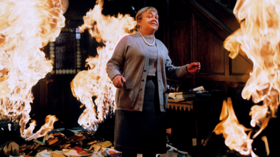"‘Flame purification’? I fear the burning of books in Canada is the first step towards something sinister and evil" by Frank Furedi
‘Flame purification’? I fear the burning of books in Canada is the first step towards something sinister and evil
is an author and social commentator. He is an emeritus professor of sociology at the University of Kent in Canterbury. Author of How Fear Works: The Culture of Fear in the 21st Century. Follow him on Twitter @Furedibyte

First, a confession. I get really emotional and upset when I encounter ritual book-burning. So when I read that in Canada, more than 4,700 books have been removed from the library shelves of schools and burned, I cannot help but feel depressed.
The book burning ceremony organised by an Ontario francophone school board was promoted as a “gesture of reconciliation” to Indigenous peoples. This barbaric act against enlightened cultural norms was labelled as a “flame purification ceremony.”
She stated that the ritual, titled ‘Redonnons à la terre’ – ‘give back to the earth’ – sought “to
make a gesture of openness and reconciliation by replacing books in our
libraries that had outdated content and carried negative stereotypes
about First Nations, Métis and Inuit people.”In line with the current fashion for recycling, Lyne Cossette, a spokeswoman for the school board, indicated that “symbolically, some books were used as fertiliser.”
The justification for the burning of books is that they contained “outdated content.” ‘Outdated’ is a favourite term of abuse hurled at opponents by zealous culture war activists. In their eyes, any publications – particularly history books – that promote the classical outlook of Western civilisation are ‘outdated’ and therefore convey views that constitute a form of secular blasphemy.
Now that the outdated books have turned to ash, the libraries can boast that the books on their shelves have “positive and inclusive messages about the diverse communities within our schools.”
While doing research for my book, ‘The Power of Reading’, I was struck by the frequency with which morally insecure but zealous dogmatists have sought to rid the world of ideas they despised.
Ever since the invention of reading texts, those deemed to be subversive have been burnt or, in today’s language, put to the flame. In 411 BC, Athenians burnt the works of Pythagoras. The Roman Emperor Caligula decreed the burning of Homer’s ‘Iliad’ and ‘Odyssey’, and the poems of Virgil and Livy. Emperor Diocletian ordered all Christian books to be burnt in 303 AD – “so great was his fear of their challenge to his supremacy,” according to a ‘A History of Reading’ by Steve Roger Fischer.
Frequently, the burning of books was portrayed as an act of purification not unlike the “flame purification ceremony” in Ontario. This motif was very much in evidence during the notorious book-burning ceremonies in Nazi Germany. Purifying German culture of poisonous Jewish and other forms of ‘offensive’ views was the justification for these ghastly rituals.
To get a flavour of how advocates of book burning understand their mission, it is worth looking at an article titled ‘The Moral Revolt of Germany’s Youth’ published in ‘Current History’ in 1922.
The author of the article, Lilian Eagle, was thoroughly enthusiastic about the “moral crusade undertaken by the youthful reformers,” the German Jugendbewegung. She wrote, ‘‘The great revolution that followed the World War, instead of proving a cleansing storm, has developed more and more into an economic struggle, and as there is no one to protect the young from post-war vices and evils they are determined to do it themselves. Smoking and drinking are tabooed. Shops with unclean postcards and books are boycotted. Flaming protests against immoral performances in the theatres and cinemas are posted in all public places by these doughty champions of public morality.”
The German school teachers, who were busy collecting “bad literature” were motivated by censorious motives, not unlike members of the book-burning school board in present-day Ontario. Tragically, before too long, many of these book-burners in 1920s Germany would bear witness to the burning of human flesh in the death camps designed to purify the world of people that were deemed as toxic.
The burning of books is a despicable crime because its aim is to destroy and eradicate views and ideas that are deemed heretical. As the radical poet John Milton so eloquently noted, ‘‘He who destroys a good book, kills reason itself, kills the image of God, as it were in the eye.”
Watch out when book burning is associated with the ritual of purification. Ask yourself the question, “What will they cleanse next?” The history of book burning tells us that the burning of books is the first step towards the vilification and brutal punishment of those in the crosshairs of the book burners.
Source: RT

Comments
Post a Comment